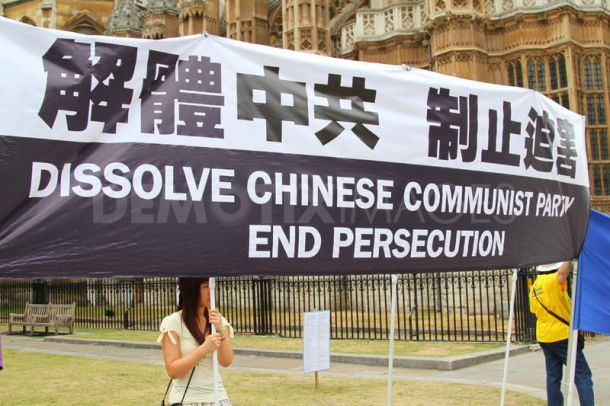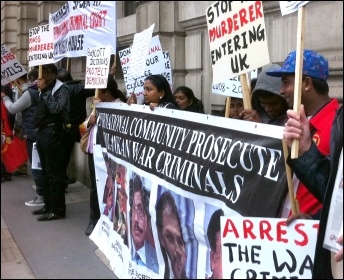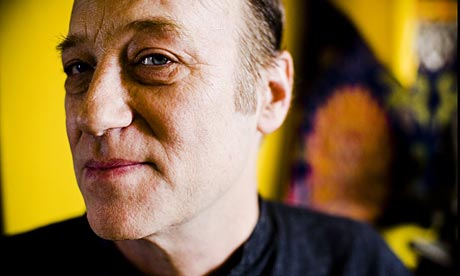Don't pick on Israel – they're People Like Us
Mike Marqusee’s two articles are interspersed with photos of popular protests against other oppressive regimes.

Yoonah Kim appeals to University of Chicago students to take action against the forced repatriation of North Korean citizens during a protest in front of the Chinese consulate February 2012.
“If not now, when?” On BDS and ‘singling out’ Israel
By Mike Marqusee, blog
January 01, 2014
[This is an edited version of a letter I’ve sent to a relative in the US who’s been trying to figure out the BDS issue in the wake of the recent onslaught against the American Studies Association’s decision to support the academic boycott.]
The “singling out” objection seems to me quite perverse. It’s not possible to campaign against any injustice anywhere without “singling it out”. When people campaigned and boycotted South Africa, they were “singling it out” – and that accusation was in fact frequently made by apologists for South Africa. “What about the black dictatorships in Africa?” they would say. This was always an evasive manoeuvre, a poor excuse for allowing gross racial oppression to continue unhindered. Many of those who raise this objection now in relation to Israel would have or indeed did dismiss it when it was raised in relation to South Africa.
There’s an implication in these arguments that Israel is really “not that bad” and somehow deserves a break from criticism. But just how “bad” does a regime have to get before it’s subject to penalties? The facts on the ground day-by-day show without doubt that Israel in its treatment of the Palestinians IS one of the world’s worst, most brutal, most racist, most oppressive regimes. There’s a huge element of denialism in many pro-Israel arguments and sentiments: something a bit like the denialism of generations of sincere Communists in regard to Stalinism and the Soviet Union. The difference being that in the latter case, the denialism was driven by an ideological identification, whereas in the Israel case it’s driven by an ethnic identification. I think what’s behind a lot of this is a deep reluctance to believe that “people like us” could commit such terrible crimes. That attitude has a long and very grim history and needs to be rejected.
Amnesty International campaigns against state killings in Sudan
Of course Israel is not the only regime worthy of active opposition and censure, and in fact, most people I know in the BDS movement have been and are involved in numerous other international solidarity campaigns (unlike the bulk of their opponents). But there are two factors that make Israel a particular case calling for a particular response.

By San Francisco Poster Brigade, Rachael Romero,1978
First, the BDS call has been issued by a wide and representative array of Palestinian civil society organisations, including trade unions, and enjoys strong support from Palestinians in both the occupied territories and Israel itself. There is at the moment no similar call being issued by people engaged in a struggle against other oppressive regimes: the opposition in Burma, for example, has backed a relaxing of sanctions, because they believe that it will strengthen their position. BDS is not a universally appropriate strategy; it’s a particular tactic chosen because of its potential effectiveness in a particular situation. And most importantly it’s chosen by the people on the sharp end, the people affected by Israel’s policies, just as it was in South Africa, when poll after poll revealed that black South Africans overwhelmingly supported the ANC’s call for boycott, sanctions and disinvestment – which proved to be a highly effective tactic and one of the major factors in the final defeat of apartheid.
Arguing that one should ignore this specific call for BDS because it is not simultaneously aimed at all other oppressive regimes is like arguing that you should cross a picket line because the union in dispute isn’t simultaneously picketing all other bad employers. In fact, I think defying the Palestinian BDS call is very much like crossing a picket line: it shows a contempt for or ignorance of the principle of solidarity.
Secondly, the people who constantly “single out” Israel are the US and EU and other governments that supply it with military, economic and diplomatic assistance. The repeated use of the US veto in the Security Council to protect Israel from the consequences of its actions being only one example. The demand of the BDS campaign is not that Israel should be better than other countries but that it should adhere to minimal standards of human rights and human decency. Over the years the West has given Israel an impunity which has made it ever more intransigent in relation to the Palestinians. The BDS campaign is an attempt to end that impunity, that special protected status, and create instead something like a level playing field for the Palestinians.
I have to say I’m puzzled what a “balanced” account of Israel is supposed to be. What is there that could “balance out” atrocities and ethnic cleansing – currently ongoing in the West Bank and the Negev? Whatever achievements US society has to its credit, they don’t in any way “balance out “, i.e justify, the extermination of indigenous people or the oppression of African-Americans. Shakespeare, Wordsworth etc do not “balance out” the British empire’s blood-stained record in Asia, Africa and the Caribbean.
You ask whether Israelis themselves are capable of making this assessment. In fact, there are quite a few Israelis who’ve written brilliantly and objectively about Israel’s history and politics: Ilan Pappe, Michel Warshavksy, Avi Shlaim, Jeff Halper, Shlomo Sand, and the late Tanya Reinhardt, to name only a few (all their books are well worth reading). These dissident intellectuals are for the most part supporters of the BDS movement.
For the Palestinians, the criticisms of BDS carry a particular indignity. For years they’ve been told by people in the “international community” to abandon violence and use democratic means to advance their cause. BDS is an attempt to do precisely that: a non-violent, democratic, grass-roots based effort to rouse global public opinion to put some real pressure on Israel to change its policies. Somehow it’s still not enough to earn the support of western liberals.
It’s important to remember that what BDS calls for is basically the withdrawal of the current support given to Israel by our governments and institutions. If you invest money in a company that is profiting from the settlement programme in the West Bank, you are investing in ethnic cleansing – and the first thing you should do when you learn that is simply to stop doing it. All the rest is special pleading.

Protest against Chinese government repression outside parliament, London.
On the academic boycott, the precise formulations and demands have now been worked out in great detail by a serious collective effort among academics themselves. It’s not a boycott of individual Israelis and it’s carefully targeted. Check out the various explanations on the BRICUP (British Committee for Universities in Palestine) web page.
The reality is that Palestinian academics are asking their counterparts in the US and UK to take a specific form of action to help relieve the intolerable conditions they live under, which include persistent Israeli obstruction of academic freedom. If academics in, say, France or Spain or Egypt or Argentina asked their US / British counterparts for such support, with the same clarity and precision, it would be given without hesitation by many of the people who so bitterly resent the Palestinian call. Sorry, but all I see in that is ethnic bigotry. For some people, it seems, the rights of the Palestinians are always dispensable.
As Rabbi Hillel said, “If not now, when?”
BDS is beginning to have a serious impact on Israeli society – check out Tzipi Livni’s recent warning about the dangers of ignoring it. It’s precisely because it is so effective and has such clear moral force that the pro-Israel camp hates and fears it so much and spends so much time and energy smearing its proponents and lying about its content.
I know that many people – not only in the US but in Europe also – simply do not want to acquaint themselves with the realities of Israel’s record (past and present). Can I note that in the first three days of 2014, the Israeli army has already killed a 16 year old and and an 85 year old in Gaza, plus a three year old child on Christmas eve. That’s just the tip of an iceberg. Blocking out that reality or trying to “balance” it by talking about Israel’s “achievements” is a form of intellectual-emotional bad faith. In a sense, this is itself the biggest problem facing Palestinians and anyone who wants a just and sustainable peace in the middle east.
The people pressing for BDS in US and Britain have done so in the face of an avalanche of lies, smears and threats. I’ve been on the receiving end of many of them. So I have to say one of the poorest arguments against BDS is that its supporters do this for fun, for self-promotion, for some kind of “easy” thrill (see for example Michael Kazan’s most recent exercise in self-serving intellectual dishonesty). Campaigning for BDS is anything but easy. You have to challenge a lot of mythology, a host of ingrained prejudices and assumptions backed up by an enormous propaganda machine – virtually the whole of the mainstream media. And you have to be willing to withstand vicious personal attacks. (An extreme Zionist website recently reported to its readers what it called “the good news” that I have cancer and will die soon.)

Tamil solidarity protests outside the Commonwealth Secretariat, London 2009, calling for President Mahinda Rajapaksa to be arrested for war crimes.
Contrary to the view taken by Obama-supporters, justice for Palestine isn’t some optional extra, a luxury cause reserved for the far left; it’s one of the central and decisive moral-political conflicts of our time, as Spain was in the thirties or South Africa in the 70s / 80s. In the future, those who are arguing against BDS now will look as foolish as those who argued for “neutrality” in Spain or “constructive engagement” in South Africa.
Anyway, that’s my take on it, summarised as briefly as I can. Much, much more could be and needs to be said.

Anti-Mubarak protestors in Melbourne, Australia, in solidarity with Egyptian demonstrators, 2011.
A further note on BDS and “singling out” Israel
By Mike Marqusee, blog
January 17, 2014
Opponents of the BDS campaign accuse its supporters of unfairly “singling out” Israel while neglecting a host of other deplorable regimes. It seems that until we simultaneously campaign against all outstanding injustices, any campaign against a particular injustice will remain illegitimate.
Presumably, however, the liberal critics of BDS have no objection to the Palestinians themselves “singling out” Israel and campaigning against the particular injustice that affects them. So they’re permitted to call for international support but we are not permitted to answer that call.
If we were to follow the BDS critics’ logic, every struggle for justice would be left isolated.
It’s being widely argued that the “singling out” of Israel betrays a variety of dubious motives: from anti-semitism to self-indulgent political “thrill seeking”. Why are all these people with no direct connection to Palestine so bothered about the issue? It’s sad but revealing that the one motive that is routinely discounted is sympathy with the victims of injustice and a desire to rectify that injustice.
The BDS critics see the impulse to solidarity beyond national borders as somehow unnatural. Gazing through jaundiced eyes, they view the desire to assist the Palestinians in their struggle for freedom, equality and survival as something so extraordinary that it can only be accounted for by individual or cultural pathologies.

2000 protest in Belgium against the release from captivity in London of Pinochet, murderer
What a miserable view of humanity and its potential! You take the capacity to empathise with strangers and turn it into a suspect deviation.
A few years back I was in Swaziland meeting with democracy activists engaged in a demanding struggle against the despotic Coca Cola backed monarchy. One comrade (the word they use to refer to themselves and their colleagues), having been informed that I had written about Palestine and Zionism, took me aside and told me he took a keen interest in these issues.
“We in Swaziland are not doing enough for Palestine,” he said sternly.
I replied that I thought they had their hands full already. And I couldn’t help but smile.
But the comrade was not amused. He shook his head impatiently. “That’s not how it works. We ask for solidarity so we must give solidarity.”
I felt suitably chastised.
This guy has been repeatedly beaten and jailed by the Swazi regime. He lives in a small house in an impoverished district. Over his doorway, he told me, he has hung a sign reading “Free Gaza.”
So he’s guilty of “singling out” Israel – in pursuit of an overriding commitment to mutual aid and support among oppressed peoples.
I’d like to see the liberal critics of BDS take on this redoubtable comrade. He’d give them no quarter. Not least because he’s actually committed to the universal principles they claim to uphold.
Notes and links
from Wikipedia: Mike Marqusee [above]is an American-born writer, journalist and political activist in London. He describes himself as a “deracinated New York Marxist Jew” who has lived in Britain since 1971. He writes mainly about politics, popular culture, the Indian sub-continent and cricket, and is a regular correspondent for, among others, The Guardian, Red Pepper and The Hindu. He is a JfJfP signatory.
Marqusee has been the editor of Labour Left Briefing, and an executive member of the Stop the War Coalition and the Socialist Alliance. He is also a leading figure in Iraq Occupation Focus.
Amnesty International: 50 years of defending rights in the Middle east and north africa,pdf, special report on abuses of human rights of all MENA countries, August 2011

